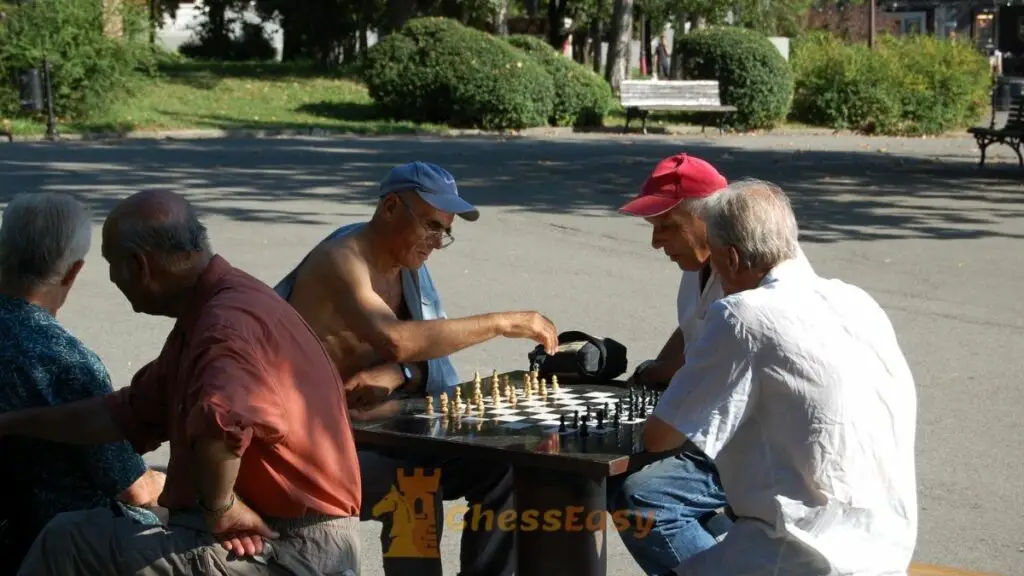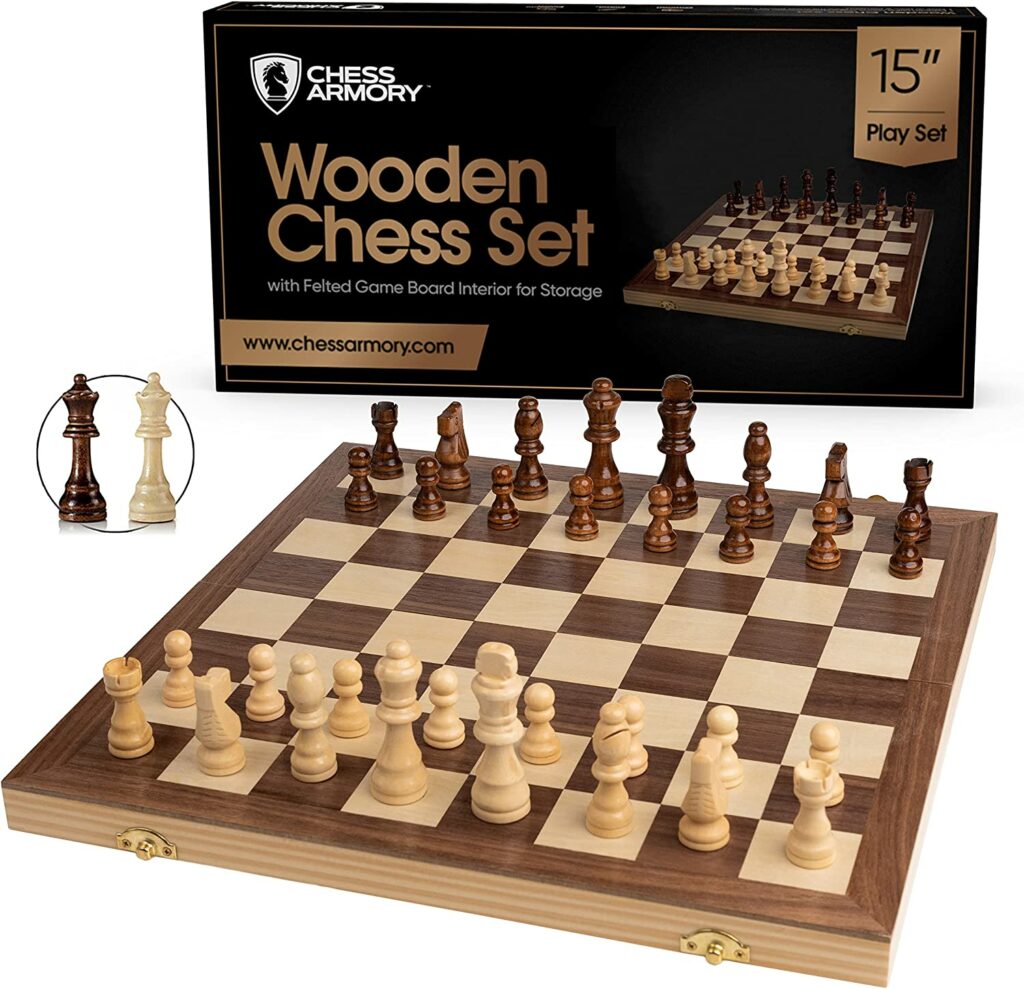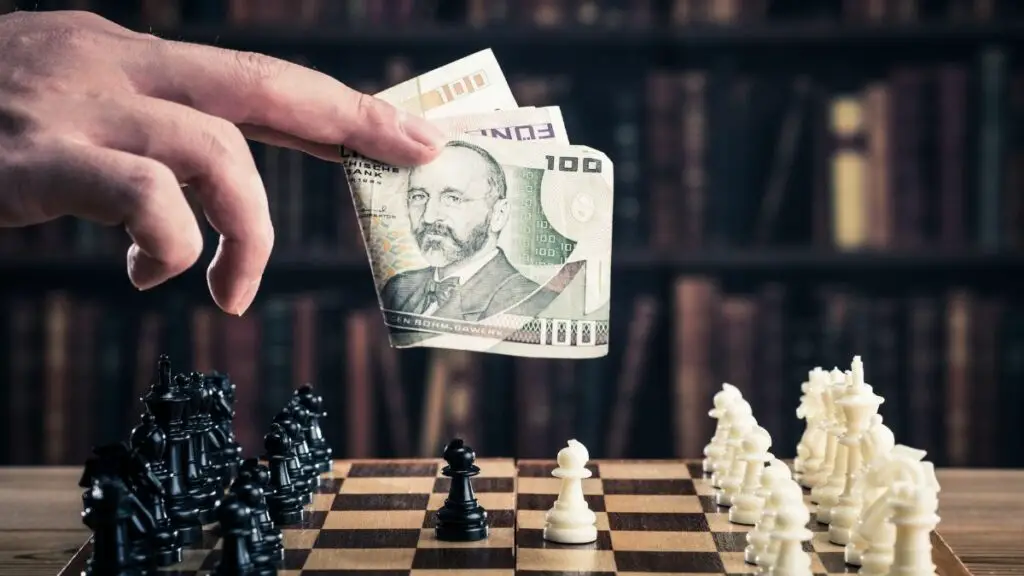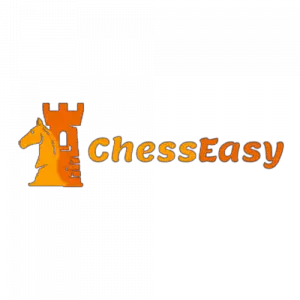Chess hustlers are players competing at the chessboard for money. Most of them hang out in parks. Some may talk trash, cheat and play for a small amount of money, while others make a good income from this game.

Chess hustling is a fixture of New York street life and is the “largest growth industry” in the city. Although gambling in chess is technically illegal, chess hustlers and legal authorities primarily ignore them. However, some of these players are heavily featured in popular newspaper articles and websites, giving them a unique brand of fame. Chess hustlers are those guys that play tourists for their bet money. You will get to see one of these if you’ve spent time doing things outdoors.

15 Inch Wooden Chess Set
The compact 15″ x 15″ chess board is made of smooth inlaid walnut, where every square measures 1.625″ x 1.625″. It folds in half, so you can store the chess pieces inside when needed.
How do chess hustlers learn?
When you ever had an opportunity to play against chess hustlers, you know that they are not pushovers; surprisingly, many are pretty decent competitors. Hence, you may wonder how they learned to play chess? Chess hustlers mostly learn to play chess by associating themselves with the other hustlers. They would compete and give tips to one another and learn the game more. Chess hustlers also improve with continuous play as they build their experience over time.
If you have ever tried learning the game as a beginner, you know it can be tricky, even with free youtube tutorials. Still, these hustlers have managed somehow, mostly without online tutorials. But learning how other people do it can be an excellent educational opportunity that is interesting and not necessarily practical.
Let’s see the different ways how chess hustlers learn and improve chess
➥ Chess hustlers learn through their experience.
Chess hustlers get the bulk of the learning through their experience; they continually play until they witness significant improvement. Most beginners study the rules and figure out the concepts by having someone teach them.
Most chess hustlers experience this, but they are more on the practical side since they make money by playing chess and not just by learning. Most of them would start by playing it even though they are likely to be horrible initially. They would know the rules as they go and pick the best strategies as they play.
In other words, they play and learn rather than learn and play; mainly, chess hustlers start in this manner as it is just the fastest way to learn. They will continue to play against both weaker and stronger opponents and, over time, develop their strength primarily through experience.
➥ Chess hustlers learn from others; they become stronger chess hustlers.
Chess hustlers majorly learn by associating themselves with the other chess hustlers who teach them about the aspects of this game. They usually have other people with whom they can talk chess. When you ever pick up an interest in something, you will always be better if you have someone with whom you can share that passion. It will keep your interest and make your stay in the game longer.
Even better is if someone in your group has actual expertise in the game and can give you valuable tips, which is the case with chess hustlers. They eventually learn chess as they have someone to talk with whenever there are concerns, and they can quickly get their answer from other experienced hustlers. Many questions from beginners are opinionated; having someone to talk to has its perks.
➥ Chess hustlers learn by playing against one other.
Chess hustlers play against one another and give tips on how they may improve their game. Interestingly, their experienced colleagues act as a coach that will help them improve. In addition, they often play against visitors who are willing to bet their money to have a chess game or two. However, that is not always the case.
Sometimes there are not as many visitors in the area they are residing in because of seasonality; there are just some days when there are not as many potential opponents. In such cases, it is more beneficial to play against other hustlers than never playing a game and never winning any money. In other words, the competition will make the weaker hustlers eventually improve their game.
Learning through the competition makes professional chess players so potent; there is no reason chess hustlers will not know the game more by competing against each other.
➥ Chess hustlers occasionally take informal chess lessons
Like with professional players, hustlers also sometimes consult someone who has a higher calibre than they can improve their game. They would not consult titled players, though they cannot afford it since the fees are much higher. However, there is someone they can go to where the cost is minimal.
Some people who learned to play chess well are willing to offer coaching services; some chess hustlers buy the services and elevate their game to a new level. Of course, many potential individuals could make up the population of those who offer these services; maybe they are another chess hustler or a powerful untitled player. These people learn more about the game than they could have by just playing, although not all of them buy these services. However, some people offer such services, and some chess hustlers testify that they have taken their services and learned something.
➥ Chess hustlers learn through chess puzzles.
Some of them like solving chess puzzles. Some chess hustlers learn the game by solving puzzles in the newspaper or with a book about chess puzzles.
Some local brands give chess puzzles in one of their sections every edition. Some chess hustlers learn by solving them. We can imagine that some will prefer books, though, since they don’t have to buy multiple newspapers to keep solving puzzles, but it is rarer.
➥ Chess hustlers learn through books and courses.
Some chess hustlers study formally through chess books or a chess course. Some go to the public library or borrow the DVD from a friend who has a chess lesson.
Another way would be courses; they may borrow from one of their friends who has a pre-recorded DVD regarding chess and learn that way. It is also one of the ways chess hustlers know.
➥ Chess hustlers can learn using the internet.
Chess hustlers are not primitive; some learned the game using the internet. However, they usually only study openings online and never really get serious about other game parts. In addition, from all the things discussed above, you may have noticed a pattern in their behaviour: they avoid spending money.
They do not want to spend so much money and only get little returns from their hustling; we must understand that chess hustling is still a form of business. However, some do not necessarily do this for a living, and they treat chess hustling as a hobby. These individuals can afford to access the internet and learn from online sources.
These individuals are usually untitled but somewhat more substantial than your average player, and they treat hustling as a side hobby; for such people, they can learn chess the same way we do.
➥ Chess hustlers occasionally learn from the titled players
Some of them are generous to give lessons after their matches, and here some weaker hustlers tune in and learn. It is pretty rare, though, since titled players are usually more interested in competitive tournaments than casual chess at the park. However, in instances where this happens, hustlers can learn from it. Especially now, when chess is becoming more popular online, many titled players want to create content for their mediums, so they occasionally play in their local park finding these hustlers. There are many more such free lessons after the documented games.
➥ Chess hustlers learn from retired and professional players
Some chess hustlers are competitive players who have retired from the game due to old age. So players have learned the same way other professionals have. Their learning methodology is the most formal one for such individuals. They read many books, have a coach when they are young, or may have even watched some chess courses.
They learned the same way as you know chess right now, so they are more relatable. However, if we talk about these hustlers, they likely have never learned the same way as the other hustlers that we regularly see. So it means that the things mentioned above may not apply to them.
Clarification on how chess hustlers learn
Many people are confused about how chess hustlers become vital for someone who plays informally; it doesn’t make sense. Professionally speaking, chess hustlers are not that strong, and it is understandable how they learned the game and got to their level. They played until they got good. Most of them brought by using their experience and some introductory study to level their hustling; however, their strength is not something that thrives in competitive tournaments. They are strong enough to beat the average chess player but will underperform against professional chess players with a title.
For the most part, they learn chess by playing day after day and learning from their friends; this is a good sign when someone wants to take this approach. However, you can still be excellent in comparison to regular chess players.
What ratings do chess hustlers have?
Chess ratings are an excellent way to place a player in the hierarchy of their chess rankings. It is very detailed to the tiny bit of number, making it incredibly accurate. Chess hustlers usually do not have an official rating but should be around 1500-1800 for most cases and occasionally 2000 based on testimonies.
Unsurprisingly, these people do not play tournament chess, therefore the lack of rating. But this does not mean that we can not use the rating system to find their skill range. For example, 1500-1800 is incredibly crafty for people who never fight in tournaments, making them reasonably strong.
Some hustlers can go beyond the 2000 mark, making them a titled player if they have an accurate rating. That is incredibly powerful; people who play in parks can beat professional players. However, it is rare for a hustler to go beyond the 2000 rating mark. It is hard to get that far without coaches and informational books to boost their stats.
It is the average where they are not too intimidating when someone cannot beat them, but not a bunch of slacks either. They would make you run the money if you don’t take them seriously; give perspective, they are good enough to beat 65% of the people who play chess. Being shy is probably even higher; only those who dedicate themselves to the game can reach that far.
Hence, these people have no problem earning income from their chess games because they are good at it. And most of the people that they play are not the ones who invest in this, so it is an easy win.
In what time format are chess hustlers the strongest?
People do not know this, but chess players would have different strengths depending on the time format. Chess hustlers, in particular, are vital in a form rarely practised in tournament settings. Chess hustlers specialized in the blitz or bullet games of 5min to 1 min. Since this is the time to control, a crowd can digest.
Fast chess is the game’s name for these people; it is those that they regularly play. Due to this, they tend to beat even stronger players because they have a sort of “home-court advantage .”Tournament chess, after all, is played within highly long hours of calculation and exhaustion. Playing quickly with the theme being tactically oriented should shake any regular tournament participant.
The opposite is true; they are pretty weak on longer time formats. Most people who play tournament chess can beat them in this aspect. However, it is probably no helpful information since they would not play in these time controls. Nevertheless, this is good detail on how the people got so strong.
How much money do chess hustlers make?

You might be wondering, how much do chess hustlers make? Well, that will mostly depend on the player’s level of skill. A highly skilled chess hustler who is aware of the ins and outs of the game may make up to USD$400 per day with enough tourist traffic. In addition, the hustler can charge $3 for a no wager game, and if you want to bet, the winner gets $5. Hustlers can also offer 30-minute lessons for $20 as another income stream.
Earning $400 a day from chess hustling might seem like a lot of money, and it is. However, the cash hustlers make from this type of sport will again depend on their skill, the number of tourist visitors, location, and work; There is no guarantee of success.
How good are chess hustlers?
One key thing about chess hustlers is that they are not quite good. Most of them are class C or B players. They excel at 5-minute chess on their turf, where they do everything to distract you. They make illegal moves and badger you with the commentary. They will say ‘no more!’ if someone often beats them.
The hustlers have a goal of how much money they wish to make in a single day. It is not a great living, but they can pay enough bills to get by in a manner that they deem acceptable. So you stand a chance even as a class C player in the local club.
Do Chess Hustlers Cheat?
It is tough to get away with cheating in chess. The majority of the chess hustlers do not cheat. However, that’s not what makes them chess hustlers. Chess hustlers make money from playing chess in an informal setting. That is all that there is to it. You agree to play for money; we decide to take your money. The hustle comes down to knowing your skill, finding a niche to exploit, and capitalizing on your opponents’ weaknesses.
It’s speculation to think that chess hustlers cheat, and for many chess hustlers, it is not a part of their repertoire. The stakes are pretty high, and their opponents are mad at them anyway, and to be caught cheating could result in an injury or loss of a source of revenue. For some, when their opponent is the only other person present, and they think they may get away with it, they may do something that may happen, like a Knight landing on a wrong square or a Bishop ending up on the opposite colour.
Conclusion
The case of chess hustlers is a good study when you want to know how far someone can take their game by just experience alone. So you are probably wondering how they learn. Unfortunately, they do not have any magic that would boost their ability exponentially in a short period; in fact, the way they do it takes more patience. Playing until eventually becoming better takes a longer time.
However, the takeaway from the article is how they try to learn the game. I hope this has been an educational read; please let us know in the comments below. I hope you enjoyed it, sleep well and play more chess.

